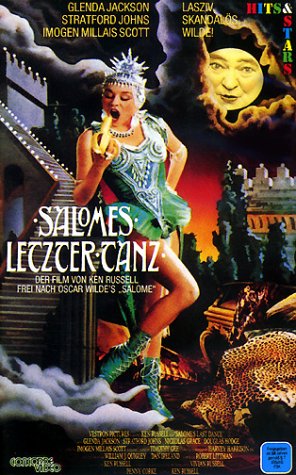
Salome's Last Dance Page #5
- R
- Year:
- 1988
- 89 min
- 301 Views
to the captains of the Assyrians?
Tell her to drag herself from
her bed of lasciviousness..
from her bed of incestuousness!
So that she may hear the words
of he who paves of the Lord..
So that she may repent her sins!
Although she will never expiate them..
but remain steadfast in her crimes!
Tell her to come!
For the Lord.. has his
scourge.. in his hands!
Oh, but he is horrible!
He is horrible!
Who is this woman who looks at me?
I do not want her to look at me.
Why is she looking at me with
her amber eyes and silver eyelids?
I don't know who she is.
I don't want to know!
Tell her to go away!
It is not to her that I wish to speak!
I am Salome,
daughter of Herodias,
Princess of Judea.
Get back, daughter of Babylon!
Fall back from the Lord's chosen one!
Your mother has stained the earth
with the wine of her iniquities..
and the cries of her sins
have reached the ears of God!
Talk on, John the Baptist!
Your voice intoxicates me!
Princess! Princess! Princess!
Speak again!
Speak again, John the Baptist!
And tell me what I must do. - Away!
Daughter of Sodom! Cover your face
with a veil and heap ashes on your head!
And go into the desert
to seek out the Son of Man!
Who is the Son of Man?
Is he as beautiful as you,
John the Baptist?
Back!
Back!
In the palace! I hear the beating
wings of the Angel of Death!
Princess, I beg you to go back inside!
Angel of the Lord!
Why are you here with your sword?
Whom do you seek in this foul palace?
The day of the one who will die
in a scarlet robe has not yet come!
John the Baptist!
- Who speaks?
John the Baptist..
I am in love with your body.
Your body is white..
like the lily of a meadow that the
scythe has never cut down.
Your body is as white..
as the snows on the mountains of Judah..
which descend to the valleys.
The roses in the garden
of the Queen of Arabia..
are not as white.. as your body.
Nor the footprints of dawn
which steal onto leaves,
nor the breasts of the
moon when she sets..
on the bosom of the sea.
There is nothing in the world
as white as your body.
Let me touch..
your body!
- Away!
Daughter of Babylon!
evil entered the world.
Do not speak to me!
I do not wish to hear you.
I listen only to the
word of the Lord God!
Your body is hideous!
It is like the body of the leper!
It is like a wall of plaster
where vipers have passed!
Like a wall of plaster where
scorpions have made their nest!
It is horrible!
It is horrible, your body!
It is your hair..
that I am in love with..
John the Baptist.
Your hair is like
bunches of black grapes..
which hang from the vines of Edom,
in the country of the Edomites.
Translation
Translate and read this script in other languages:
Select another language:
- - Select -
- 简体中文 (Chinese - Simplified)
- 繁體中文 (Chinese - Traditional)
- Español (Spanish)
- Esperanto (Esperanto)
- 日本語 (Japanese)
- Português (Portuguese)
- Deutsch (German)
- العربية (Arabic)
- Français (French)
- Русский (Russian)
- ಕನ್ನಡ (Kannada)
- 한국어 (Korean)
- עברית (Hebrew)
- Gaeilge (Irish)
- Українська (Ukrainian)
- اردو (Urdu)
- Magyar (Hungarian)
- मानक हिन्दी (Hindi)
- Indonesia (Indonesian)
- Italiano (Italian)
- தமிழ் (Tamil)
- Türkçe (Turkish)
- తెలుగు (Telugu)
- ภาษาไทย (Thai)
- Tiếng Việt (Vietnamese)
- Čeština (Czech)
- Polski (Polish)
- Bahasa Indonesia (Indonesian)
- Românește (Romanian)
- Nederlands (Dutch)
- Ελληνικά (Greek)
- Latinum (Latin)
- Svenska (Swedish)
- Dansk (Danish)
- Suomi (Finnish)
- فارسی (Persian)
- ייִדיש (Yiddish)
- հայերեն (Armenian)
- Norsk (Norwegian)
- English (English)
Citation
Use the citation below to add this screenplay to your bibliography:
Style:MLAChicagoAPA
"Salome's Last Dance" Scripts.com. STANDS4 LLC, 2024. Web. 2 Jun 2024. <https://www.scripts.com/script/salome's_last_dance_17377>.


Discuss this script with the community:
Report Comment
We're doing our best to make sure our content is useful, accurate and safe.
If by any chance you spot an inappropriate comment while navigating through our website please use this form to let us know, and we'll take care of it shortly.
Attachment
You need to be logged in to favorite.
Log In